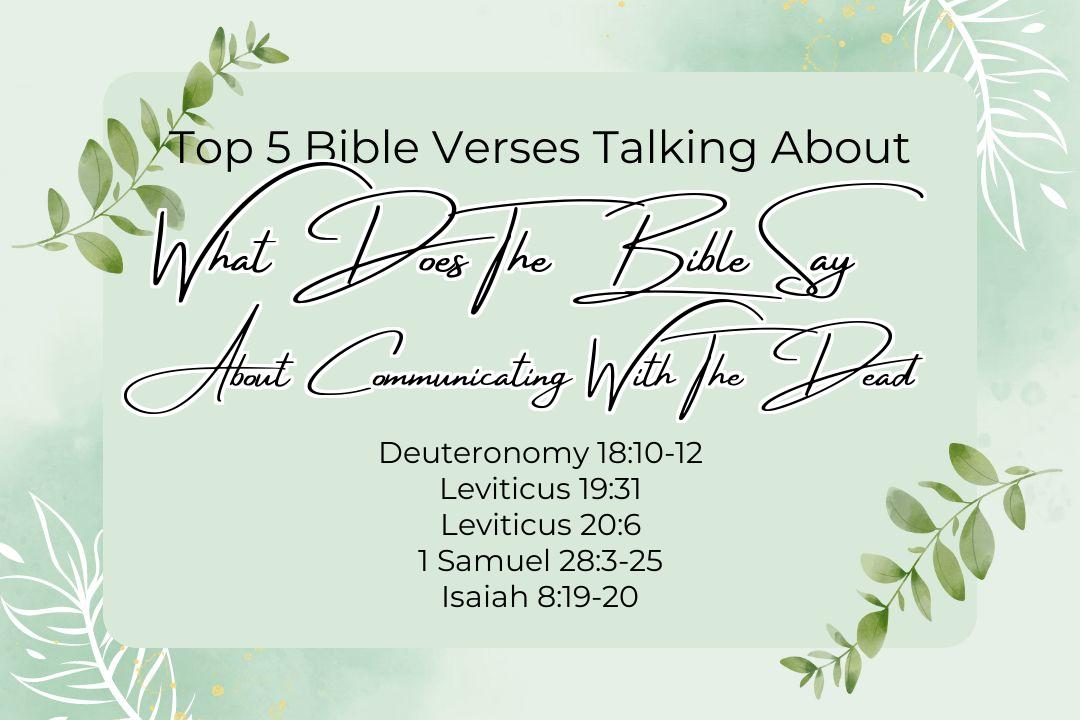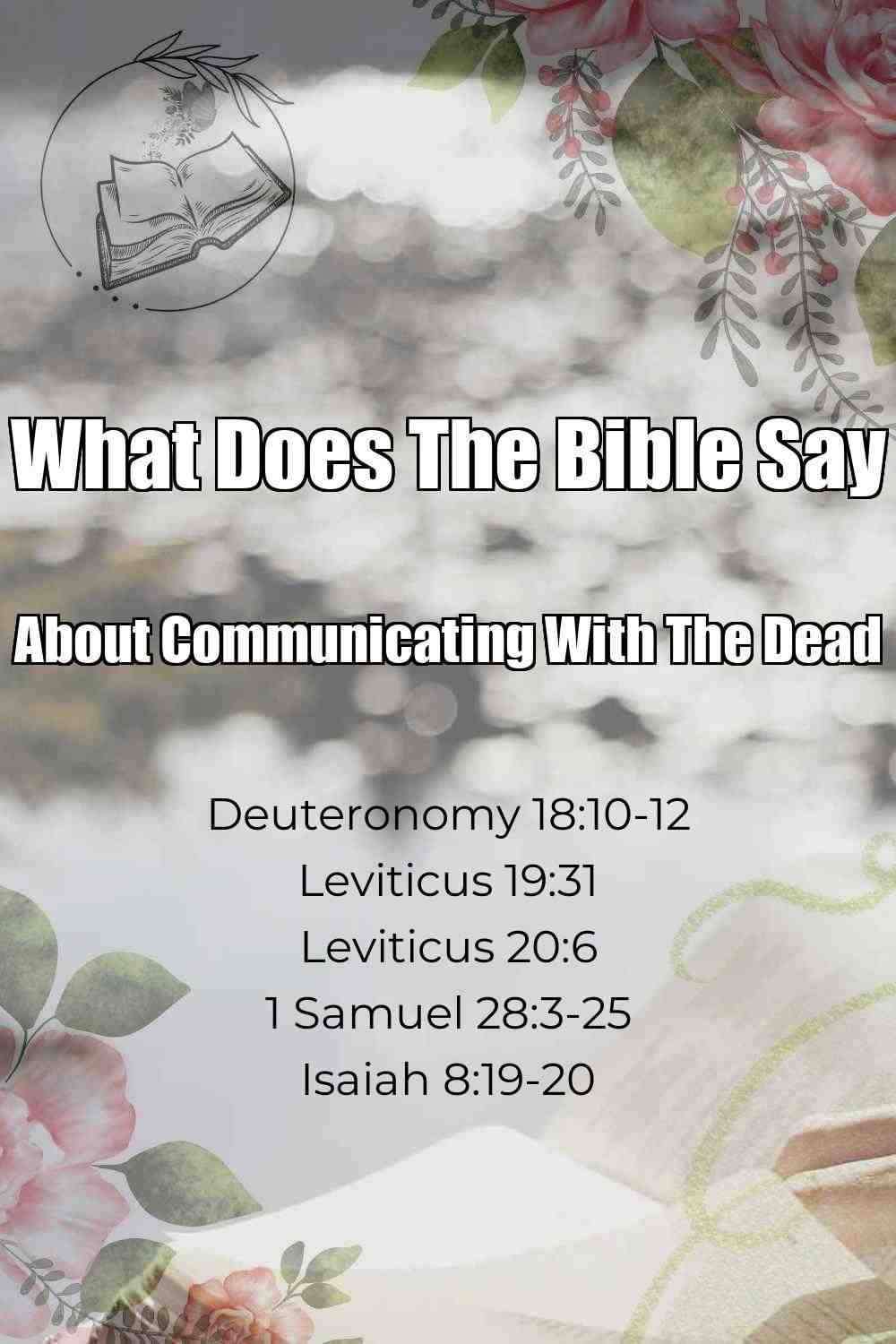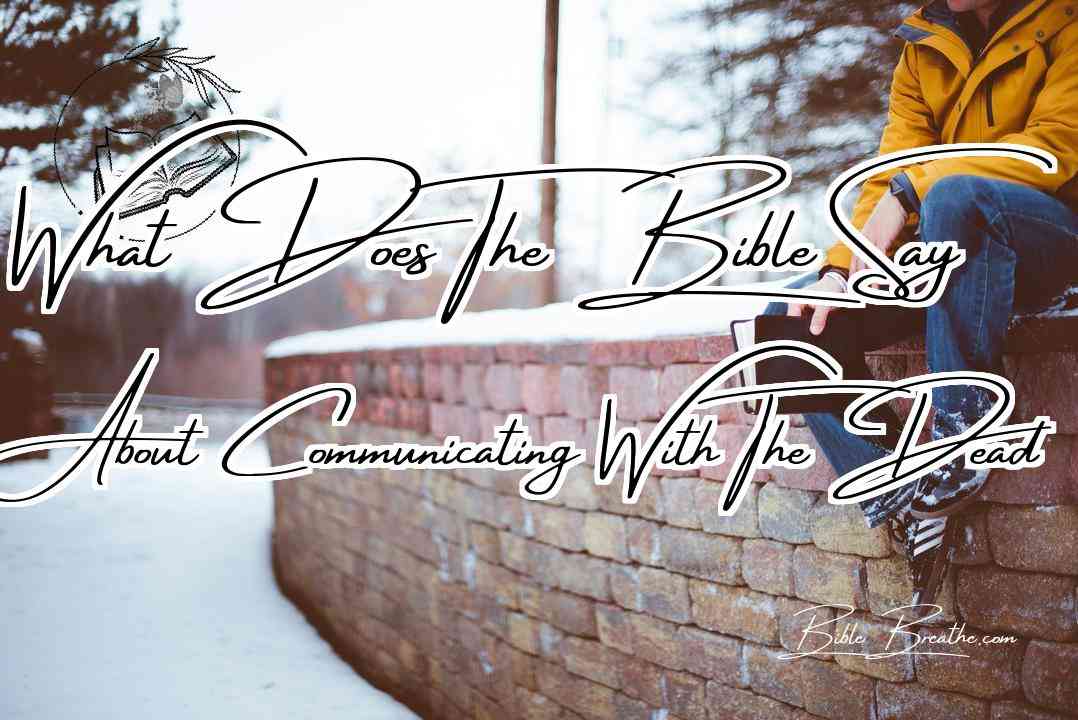I’ve always been a bit spooked by those Ouija boards, to be honest – there’s something unnerving about trying to reach out to the other side. The Bible, though, has some pretty clear thoughts on the whole communicating-with-the-dead thing, and I’ve been wondering, what’s the deal? Can we really ‘talk’ to our loved ones who’ve passed away, or is something a bit more, well, dodgy going on? I decided to dig in and see what the Bible actually says about all this – and what I found out was pretty surprising, to say the least.
Top 5 Bible Verses About What Does The Bible Say About Communicating With The Dead
I’ve found these verses super helpful in wrapping my head around this topic. Honestly, they’ve got some pretty interesting insights that kinda shed new light on the whole thing. They’re like, really good at adding some extra depth to the conversation, you know?

Picture by BibleBreathe.com about What Does The Bible Say About Communicating With The Dead
Biblical Prohibitions on Communicating with the Dead
Old Testament Warnings Against Necromancy and Spiritism
I’ve been reading through the Bible, and I keep coming across these warnings in the Old Testament about communicating with the dead. It’s pretty clear that the practice of necromancy – you know, trying to get guidance from dead people – is a big no-no.
The Bible says,
“There shall not be found among you any one that maketh his son or his daughter to pass through the fire, or that useth divination, or an observer of times, or an enchanter, or a witch, or a charmer, or a consulter with familiar spirits, or a wizard, or a necromancer.” (Deuteronomy 18:10-11, KJV).
I mean, this verse is pretty straightforward – seeking guidance from the dead isn’t just discouraged, it’s actually considered an abomination. That’s some serious stuff.
New Testament Teachings on the Occult and Demonic Activity
When I flip over to the New Testament, I see that the warnings about the occult and demonic activity are still there. Paul’s all like, “guys, be careful – Satan and his minions are sneaky.”
The Bible says,
“For we wrestle not against flesh and blood, but against principalities, against powers, against the rulers of the darkness of this world, against spiritual wickedness in high places.” (Ephesians 6:12, KJV).
This verse always makes me think about how our struggles aren’t really against other people, but against these dark spiritual forces that are trying to mess with us.
Key Bible Verses Prohibiting Communication with the Dead
So, what’s the Bible’s take on communicating with the dead? Here are some key verses to keep in mind:
- “And the soul that turneth after such as have familiar spirits, and after wizards, to go a whoring after them, I will even set my face against that soul, and will cut him off from among his people.” (Leviticus 20:6, KJV)
- “For the living know that they shall die: but the dead know not any thing, neither have they any more a reward; for the memory of them is forgotten.” (Ecclesiastes 9:5, KJV)
- “And when they shall say unto you, Seek unto them that have familiar spirits, and unto wizards that peep, and that mutter: should not a people seek unto their God? for the living to the dead?” (Isaiah 8:19, KJV)
These verses all seem to be saying the same thing: communicating with the dead is not only forbidden, but it’s also pretty pointless. We should be looking to the living God for guidance, not trying to chat with dead people.
The Nature of Death and the Afterlife
My Take on the Bible’s Teaching on Death and the Soul
I’ve been thinking a lot about what the Bible says on communicating with the dead, and that verse from Solomon keeps popping into my head,
“Then shall the dust return to the earth as it was: and the spirit shall return unto God who gave it” (Ecclesiastes 12:7, KJV).
It’s pretty clear – when we kick the bucket, our bodies go back to the earth, and our spirits go back to God. But, I mean, what does that mean for our souls, right?
From what I’ve read in the Bible, it seems like our souls are what make us, us. Like, in Genesis 2:7, it says God breathed life into Adam, and he became a living soul. To me, that means our souls aren’t just some fancy idea, but a real part of who we are that sets us apart from, like, animals and stuff.
Sheol and Hades – What’s the Deal?
So, what happens to our souls when we die? The Bible talks about this place called Sheol, which is like, the underworld or the grave. In Psalm 139:8, David writes,
“If I ascend up into heaven, thou art there: if I make my bed in hell, behold, thou art there” (Psalm 139:8, KJV).
Here, David’s using the word “hell” to translate the Hebrew word Sheol. That tells me Sheol’s not just some physical place, but like, a spiritual realm where our souls hang out after we die.
In the New Testament, they use the Greek word Hades to describe the same thing. In Revelation 20:14, it says Hades will get tossed into the lake of fire, which is like, the ultimate destruction of death and the grave.
Heaven and Hell – What’s the Christian Take?
So, what’s the deal with heaven and hell, then? As a Christian, I believe heaven’s like, this amazing place where we get to hang out with God forever, and hell’s like, this awful place where we’re separated from God forever. In Matthew 25:46, Jesus says that if we follow Him, we’ll get eternal life, but if we reject Him, we’ll get eternal punishment.
That raises some big questions about communicating with the dead. If our souls are either in heaven or hell after we die, can we still talk to them? The Bible’s pretty clear on this – once we’re gone, that’s it, and we can’t talk to the living no more. In Luke 16:26, Jesus says there’s this huge gap between heaven and hell, and nobody can cross it.
Thinking about what the Bible says on communicating with the dead, it hits me how important it is to live our lives on purpose. We only get one shot, and what we choose to do has eternal consequences. Let’s make the most of the time we got, and prioritize our relationship with God above everything else.
The Dangers of Seeking Guidance from the Dead

Photo modified by BibleBreathe.com. Original photo by Rod Long on Unsplash
I’ve Learned the Risks of Demonic Deception and Manipulation the Hard Way
To be frank, there’s been times when I’ve thought about communicating with the dead – I mean, who wouldn’t want answers or closure, right? Thing is, the Bible’s pretty clear on this one: seeking guidance from the dead is basically asking for trouble.
It’s written in the Bible,
“And the soul that turneth after such as have familiar spirits, and after wizards, to go a whoring after them, I will even set my face against that soul, and will cut him off from among his people.” (Leviticus 20:6, KJV).
What I take from this verse is that seeking guidance from mediums and psychics is kinda like spiritual cheating, and it can have some serious consequences – we’re talkin’ cut-off-from-God’s-people serious.
I’ve Been Studying the Bible’s Warnings Against Seeking Guidance from Mediums and Psychics
I’ve been reading the Bible a lot lately, and let me tell you, it’s full of warnings against seeking guidance from mediums and psychics. Like, in the book of Deuteronomy, it says,
“There shall not be found among you any one that maketh his son or his daughter to pass through the fire, or that useth divination, or an observer of times, or an enchanter, or a witch, or a charmer, or a consulter with familiar spirits, or a wizard, or a necromancer.” (Deuteronomy 18:10-11, KJV).
It’s pretty clear to me that God’s not cool with us seeking guidance from the dead or from people who claim to have supernatural powers – it’s just not what He wants for us.
I’ve Learned to Seek Guidance from God and His Word Instead
So, what’s the alternative, right? How can we find the guidance we need without turning to the dead or to mediums and psychics? For me, it’s simple: we need to turn to God and His Word.
I mean, the Bible says,
“Thy word is a lamp unto my feet, and a light unto my path.” (Psalm 119:105, KJV).
This verse always reminds me that God’s Word is like, my guide, my lamp, and my light – it’s where I find wisdom, and it’s the only place where I can find true guidance and direction.
I was reading this thing that Charles Spurgeon said once, “The Bible is the cradle wherein Christ is laid.” It’s like, the Bible is the source of all truth, you know? And it’s the only place where we can find true guidance and direction.
So yeah, next time I’m tempted to seek guidance from the dead or from mediums and psychics, I’ll just remember that God’s Word is where it’s at – it’s where I’ll find true wisdom and direction. I’ll turn to Him, and He’ll guide me on my journey.
My Take on Biblical Examples of Communication with the Dead
That Time Saul Met the Witch of Endor
I gotta say, the story of Saul and the witch of Endor in 1 Samuel 28 has always kinda blown my mind.
So, Saul, the king of Israel, is getting pretty desperate for some guidance, and he’s all, “I know it’s against the rules, but I’m gonna go talk to a medium anyway.”
The Bible puts it like this:
“And when Saul enquired of the Lord, the Lord answered him not, neither by dreams, nor by Urim, nor by prophets.” (1 Samuel 28:6, KJV).
Anyway, things don’t exactly work out for Saul – his little chat with the dead ends up costing him his life.
Moral of the story? Don’t go trying to talk to dead people, ‘kay?
The Story of Lazarus and That Rich Guy
There’s this other story in Luke 16 that’s always stuck with me – the one about Lazarus and the rich dude.
Jesus is basically saying, “you can’t just go talk to dead people whenever you feel like it.”
Here’s what the Bible says:
“And beside all this, between us and you there is a great gulf fixed: so that they which would pass from hence to you cannot; neither can they pass to us, that would come from thence.” (Luke 16:26, KJV).
So yeah, it’s pretty clear – there’s this huge gap between the living and the dead, and you can’t just go chatting with dead people willy-nilly.
Some Other Stuff About Communication with the Dead
Now, I know some of you might be thinking, “But what about that time Jesus met up with Moses and Elijah in Matthew 17?”
Thing is, that was a special case – God was all, “I’m gonna make this happen,” and it wasn’t just some human trying to talk to dead people.
Actually, the Bible’s pretty clear on this stuff – we’re not supposed to mess around with spiritism or necromancy, as seen in Deuteronomy 18:10-12 and Isaiah 8:19-20.
So yeah, let’s all just stick to talking to God, ‘kay?
My Take on the Christian Alternative to Communicating with the Dead
Why Prayer and Seeking Guidance from God Matters to Me
Reflecting on the Bible’s stance on communicating with the dead, I gotta say, I’ve lost count of how many times I’ve turned to God in prayer for guidance. It’s only natural to wanna tap into the wisdom of those who came before us when we’re stuck or unsure. But the Bible’s pretty clear – our go-to source for guidance should be God.
The Bible says,
“If any of you lack wisdom, let him ask of God, that giveth to all men liberally, and upbraideth not; and it shall be given him.” (James 1:5, KJV).
This verse gives me the confidence to approach God with my questions, trusting He’ll give me the wisdom I need.
How the Holy Spirit Guides Believers Like Me
As a believer, I’m grateful for the gift of the Holy Spirit living inside me. The Holy Spirit’s like my guide, comforter, and teacher all rolled into one. Whenever I’m unsure about what to do or how to navigate a tough spot, the Holy Spirit’s always there to offer guidance and direction.
The Bible says,
“But the Comforter, which is the Holy Ghost, whom the Father will send in my name, he shall teach you all things, and bring all things to your remembrance, whatsoever I have said unto you.” (John 14:26, KJV).
This verse reminds me I’m not alone in this journey; the Holy Spirit’s got my back, guiding and teaching me along the way.
What the Bible Says About the Communion of Saints
Now, I know the Bible talks about how we’re all connected to other believers, dead or alive, through the communion of saints. But here’s the thing – this connection isn’t about communicating with the dead. It’s more like… we’re all part of the body of Christ, and our prayers and worship are linked with those of believers throughout history.
The Bible says,
“Wherefore seeing we also are compassed about with so great a cloud of witnesses, let us lay aside every weight, and the sin which doth so easily beset us, and let us run with patience the race that is set before us.” (Hebrews 12:1, KJV).
This verse encourages me to remember I’m part of a bigger community of believers, and together, we can run this faith marathon with patience and perseverance.
Dealing with Grief and Loss in a Biblical Way
The Bible’s Teaching on Grief and Mourning
Losing my grandmother was like, this huge blow that left me reeling. I recall feeling lost, and desperate for some kinda answers. What was the Bible’s take on talking to the dead, I wondered? Was it even possible to connect with those who’d passed on?
The Bible says,
“For the living know that they shall die: but the dead know not any thing, neither have they any more a reward; for the memory of them is forgotten.” (Ecclesiastes 9:5, KJV).
This verse, it kinda hit me – the dead, they’re not aware of what’s going down on earth, according to the Bible. They ain’t watching over us or trying to communicate or nothing.
The Importance of Seeking Comfort from God and His People
So yeah, how do we cope with the pain of losing someone we love? The Bible’s all about seeking comfort from God and His people, you know? When we’re grieving, it’s super important to surround ourselves with believers who can offer support, prayer, and just a listening ear, you feel?
The Bible says,
“Blessed are they that mourn: for they shall be comforted.” (Matthew 5:4, KJV).
This verse, it’s like, God’s the ultimate Comforter, you know? He gets our pain, and He’s always there to offer solace and peace.
The Christian Hope of Eternal Life and Reunion with Loved Ones
As Christians, we got this hope that sets us apart from the world, right? We believe in eternal life, and that one day we’ll be reunited with our loved ones who’ve passed on.
The Bible says,
“For I am persuaded, that neither death, nor life, nor angels, nor principalities, nor powers, nor things present, nor things to come, nor height, nor depth, nor any other creature, shall be able to separate us from the love of God, which is in Christ Jesus our Lord.” (Romans 8:38-39, KJV).
This verse, it’s like… nothing, not even death, can separate us from God’s love, you know? And because of that, we can face grief and loss with hope and confidence, knowing we’ll see our loved ones again in heaven.
What Do You Think?
If this verse has touched your life in a special way, let us know! Share your reflections or experiences in the comments and help build our community’s understanding.
If this post resonated with you, share it on your social networks and explore more articles on our site!

Photo modified by BibleBreathe.com. Original photo on Unsplash.
Frequently Asked Questions About What Does The Bible Say About Communicating With The Dead
Is it biblical to communicate with the dead?
To be frank, I think the Bible’s stance on this is pretty straightforward. I mean, have you read Deuteronomy 18:10-12 and Leviticus 19:31? It basically says, don’t bother trying to contact the dead for guidance or whatever. We should be looking to God for wisdom, not some deceased person. And let’s be real, trying to communicate with the dead can get pretty messy, spiritually speaking.
What does the Bible say about talking to spirits or ghosts?
I’ve gotta say, the Bible’s not exactly keen on the whole spirit-talking thing. I’m looking at Deuteronomy 18:10-12 and Leviticus 19:31, and it’s pretty clear: don’t seek guidance from spirits, period. God’s all, “come to me for answers, not some ghost.” And honestly, that makes sense to me. Why bother with the dead when you’ve got the living God, right?
Is seeking guidance from mediums or psychics against biblical teachings?
Yeah, I’d say that’s a definite no-go, biblically speaking. I mean, Deuteronomy 18:10-12 and Leviticus 20:27 are pretty explicit: don’t go to mediums or psychics for guidance. It’s not that God’s trying to be all controlling or whatever; He just wants us to trust Him, you know? And when we start seeking guidance from other sources, it’s like, we’re kinda saying, “God, I don’t really trust you.” Not good.
Matt Turner
I’m Matt, and I love breaking down Bible verses in a way that’s easy to understand and apply to everyday life. My goal is to help you connect with God’s Word and find practical ways to live it out. Whether you’re new to the Bible or just looking for some fresh insights, I’m here to walk with you and share what I’ve learned along the way.

